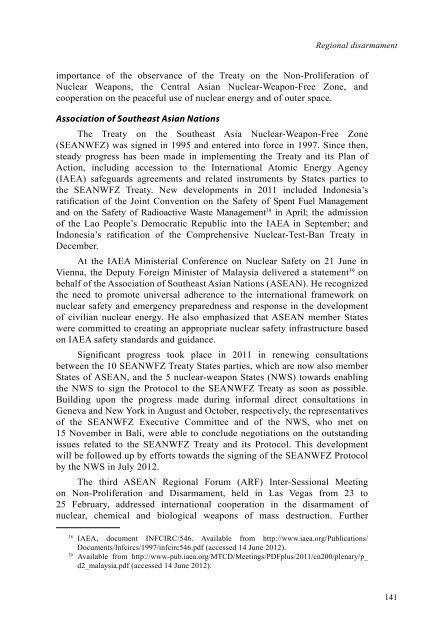DYB2011-Part-II-web
DYB2011-Part-II-web
DYB2011-Part-II-web
You also want an ePaper? Increase the reach of your titles
YUMPU automatically turns print PDFs into web optimized ePapers that Google loves.
Regional disarmament<br />
importance of the observance of the Treaty on the Non-Proliferation of<br />
Nuclear Weapons, the Central Asian Nuclear-Weapon-Free Zone, and<br />
cooperation on the peaceful use of nuclear energy and of outer space.<br />
Association of Southeast Asian Nations<br />
The Treaty on the Southeast Asia Nuclear-Weapon-Free Zone<br />
(SEANWFZ) was signed in 1995 and entered into force in 1997. Since then,<br />
steady progress has been made in implementing the Treaty and its Plan of<br />
Action, including accession to the International Atomic Energy Agency<br />
(IAEA) safeguards agreements and related instruments by States parties to<br />
the SEANWFZ Treaty. New developments in 2011 included Indonesia’s<br />
ratification of the Joint Convention on the Safety of Spent Fuel Management<br />
and on the Safety of Radioactive Waste Management38 in April; the admission<br />
of the Lao People’s Democratic Republic into the IAEA in September; and<br />
Indonesia’s ratification of the Comprehensive Nuclear-Test-Ban Treaty in<br />
December.<br />
At the IAEA Ministerial Conference on Nuclear Safety on 21 June in<br />
Vienna, the Deputy Foreign Minister of Malaysia delivered a statement39 on<br />
behalf of the Association of Southeast Asian Nations (ASEAN). He recognized<br />
the need to promote universal adherence to the international framework on<br />
nuclear safety and emergency preparedness and response in the development<br />
of civilian nuclear energy. He also emphasized that ASEAN member States<br />
were committed to creating an appropriate nuclear safety infrastructure based<br />
on IAEA safety standards and guidance.<br />
Significant progress took place in 2011 in renewing consultations<br />
between the 10 SEANWFZ Treaty States parties, which are now also member<br />
States of ASEAN, and the 5 nuclear-weapon States (NWS) towards enabling<br />
the NWS to sign the Protocol to the SEANWFZ Treaty as soon as possible.<br />
Building upon the progress made during informal direct consultations in<br />
Geneva and New York in August and October, respectively, the representatives<br />
of the SEANWFZ Executive Committee and of the NWS, who met on<br />
15 November in Bali, were able to conclude negotiations on the outstanding<br />
issues related to the SEANWFZ Treaty and its Protocol. This development<br />
will be followed up by efforts towards the signing of the SEANWFZ Protocol<br />
by the NWS in July 2012.<br />
The third ASEAN Regional Forum (ARF) Inter-Sessional Meeting<br />
on Non-Proliferation and Disarmament, held in Las Vegas from 23 to<br />
25 February, addressed international cooperation in the disarmament of<br />
nuclear, chemical and biological weapons of mass destruction. Further<br />
38 IAEA, document INFCIRC/546. Available from http://www.iaea.org/Publications/<br />
Documents/Infcircs/1997/infcirc546.pdf (accessed 14 June 2012).<br />
39 Available from http://www-pub.iaea.org/MTCD/Meetings/PDFplus/2011/cn200/plenary/p_<br />
d2_malaysia.pdf (accessed 14 June 2012).<br />
141


